leave复合结构
leave+宾语+宾补的用法

The movingstory left himunmoved.他对这个令人激动的故事竟然无动于衷。
2.由现在分词来充当宾语补足语:leave sb/sth doing,常用来表示使某人或某物一直做某事(宾语和宾补被动关系).
3.由形容词来充当宾语补足语:
(1)You’dbetter leavethe drawing-room dooropen.
(2)Hisillnesshaslefthimweak.
△可用于被动语态:
Thewindow wasleft open.
4.由副词作宾语补足语
(1)What haslefthimawayfor so long?什么事使他离开了这么长时间?
3.John rushed outin a hurry,______the door _______.
A.leaving, unlocked B. leaving, unlocking C.left,unlockedD.toleave, unlocking
4.Don’tleave the water______ whileyou brushyour teeth.
△可用于被动语态:
I wasleftwithout a ray of hope.
5.由名词作宾语补足语
The earthquakelefthim an orphan.
【试题精选】
1.Agoodstorydoes notnecessarilyhavetohaveahappyending,but thereadermust notbe left______.(06天津卷)
leave+宾语+宾补
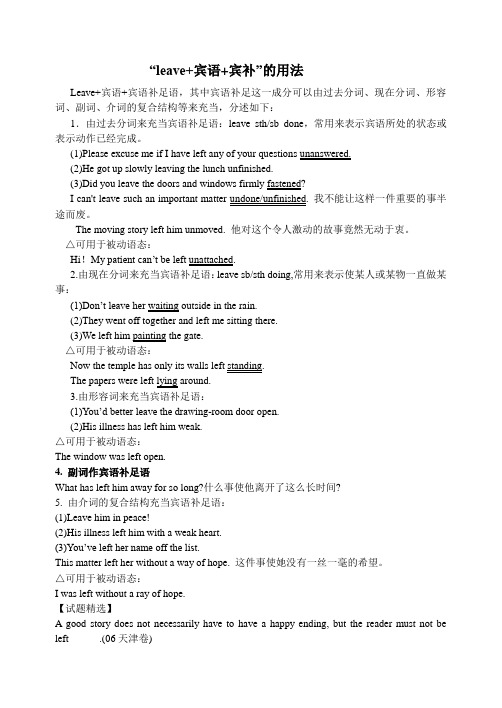
“leave+宾语+宾补”的用法Leave+宾语+宾语补足语,其中宾语补足这一成分可以由过去分词、现在分词、形容词、副词、介词的复合结构等来充当,分述如下:1.由过去分词来充当宾语补足语:leave sth/sb done,常用来表示宾语所处的状态或表示动作已经完成。
(1)Please excuse me if I have left any of your questions unanswered.(2)He got up slowly leaving the lunch unfinished.(3)Did you leave the doors and windows firmly fastened?I can't leave such an important matter undone/unfinished. 我不能让这样一件重要的事半途而废。
The moving story left him unmoved. 他对这个令人激动的故事竟然无动于衷。
△可用于被动语态:Hi!My patient can’t be left unattached.2.由现在分词来充当宾语补足语:leave sb/sth doing,常用来表示使某人或某物一直做某事:(1)Don’t leave her waiting outside in the rain.(2)They went off together and left me sitting there.(3)We left him painting the gate.△可用于被动语态:Now the temple has only its walls left standing.The papers were left lying around.3.由形容词来充当宾语补足语:(1)You’d better leave the drawing-room door open.(2)His illness has left him weak.△可用于被动语态:The window was left open.4. 副词作宾语补足语What has left him away for so long?什么事使他离开了这么长时间?5. 由介词的复合结构充当宾语补足语:(1)Leave him in peace!(2)His illness left him with a weak heart.(3)You’ve left her name off the list.This matter left her without a way of hope. 这件事使她没有一丝一毫的希望。
leave句型结构
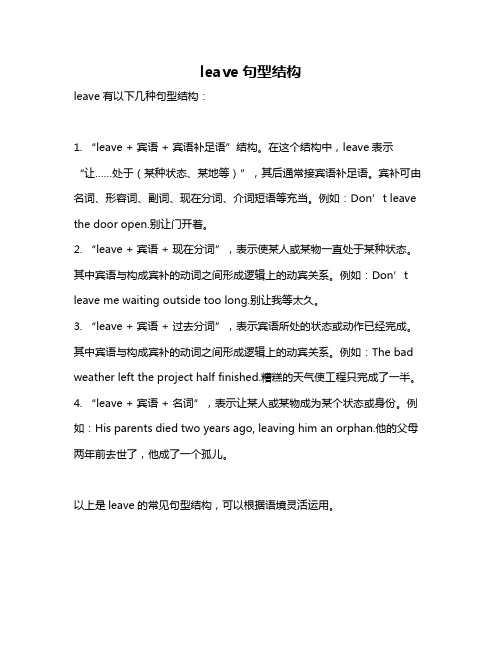
leave句型结构
leave有以下几种句型结构:
1. “leave + 宾语 + 宾语补足语”结构。
在这个结构中,leave表示“让……处于(某种状态、某地等)”,其后通常接宾语补足语。
宾补可由名词、形容词、副词、现在分词、介词短语等充当。
例如:Don’t leave the door open.别让门开着。
2. “leave + 宾语 + 现在分词”,表示使某人或某物一直处于某种状态。
其中宾语与构成宾补的动词之间形成逻辑上的动宾关系。
例如:Don’t leave me waiting outside too long.别让我等太久。
3. “leave + 宾语 + 过去分词”,表示宾语所处的状态或动作已经完成。
其中宾语与构成宾补的动词之间形成逻辑上的动宾关系。
例如:The bad weather left the project half finished.糟糕的天气使工程只完成了一半。
4. “leave + 宾语 + 名词”,表示让某人或某物成为某个状态或身份。
例如:His parents died two years ago, leaving him an orphan.他的父母两年前去世了,他成了一个孤儿。
以上是leave的常见句型结构,可以根据语境灵活运用。
leave宾语宾补的用法

法总结Leave+宾语+宾语补足语,其中宾语补足语这一成分可以由过去分词、现在 分词、形容词、副词、介词的复合结构等来充当,意思是”使••…处于…状态;听 任;让”现分述如下:1. 由过去分词来充当宾语补足语:leave sth/sb done ,常用来表示宾语所处 的状态或表示动作已经完成。
(宾语和宾补被动关系)(1) He got up slowly, leav ing the lunch unfini shed.(2) Did you leave the doors and win dows firmly faste ned?(3) 1 can't leave such an important matter undone/unfinished. 我不能让这样一 件重要的事半途而废。
The movi ng story left him unm oved.他对这个令人激动的故事竟然无动于 衷。
2. 由现在分词来充当宾语补足语:leave sb/sth doing,常用来表示使某人或某 物一直做某事(宾语和宾补被动关系).(1) Don ' t leave her waiting outside in the rain.(2) They went off together and left me sitti ng there.(3) We left him pain ti ng the gate.△可用于被动语态:The papers were left lying aro und.3. 由形容词来充当宾语补足语:(2)His ill ness has left him weak.△可用于被动语态:leave 宾语+xx (即leave 复合结构)的用 (1) You d better leave the drawin m door ope n.The wi ndow was left ope n.4•由副词作宾语补足语(1) What has left him away for so lo ng?什么事使他离开了这么长时间?(2) We can ' t leave the light on when leaving.5.由介词的复合结构充当宾语补足语:(1) Leave him in peace!(2) His ill ness left him with a weak heart.(3) You ' ve left her name off the list.⑷This matter left her without a way of hope.这件事使她没有一丝一毫的希望。
make, let, keep, have, get, leave, catch, find常见复合结构
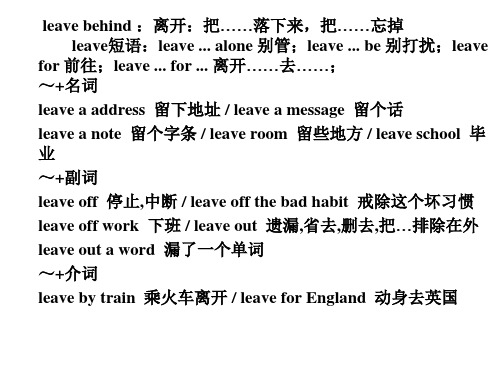
make +间宾+直宾 He made us some coffee. He made some coffee for us. make+ O +V What made you change your mind? The prisoners are made to dig holes and fill them in again.
6. catch sb. doing He was caught stealing. A cook will be immediately fired if he is found ____ (smoke) in the kitchen. I was glad to see the children well ___ (take) care of. ----Come on, please give me some ideas about the project. --- Sorry. With so much work ____ my mind, I almost break down. A. filled B. filling C. to fill D. being filled
刘树凯 牛鹏飞 3组 王依婷 郝立超 周港磊
卞国昊 邵文杰 张 凯 9组 徐 飞 王文磊 满康乐 李浩东
张国锋 张志浩 韩昊霖 6组 张 甜 周思雨 韩凯栋
顾芳冰 孙煜栋 泥 涛 2组
魏中硕 陈雨嵩 王企瑞 高子涵 8组
王昆明 韩 程 张 佳 5组
高朋丽 李成龙 王乐泽
王义豪 孙祥雨 李海云 李梦坤
5. find + O + adj. / doing/ done/ 介词短语 find + it + adj. + to do I found the job boring. I found the door closed. We found him waiting for us at the station. The day I got back, I found a note on my desk. When he came to, he found himself surrounded by enemies. Some children find it difficult to concentrate. Richard was disappointed to find his suggestions _____ A. being turned down B. turned down C. to be turned down D. to turn down
(完整版)leave+宾语+宾补的用法

“leave+宾语+宾补”(即leave复合结构)的用法总结Leave+宾语+宾语补足语,其中宾语补足语这一成分可以由过去分词、现在分词、形容词、副词、介词的复合结构等来充当,意思是”使.....处于…..状态;听任;让”现分述如下:1.由过去分词来充当宾语补足语:leave sth/sb done,常用来表示宾语所处的状态或表示动作已经完成。
(宾语和宾补被动关系)(1)He got up slowly, leaving the lunch unfinished.(2)Did you leave the doors and windows firmly fastened?(3)I can't leave such an important matter undone/unfinished. 我不能让这样一件重要的事半途而废。
The moving story left him unmoved. 他对这个令人激动的故事竟然无动于衷。
2.由现在分词来充当宾语补足语:leave sb/sth doing,常用来表示使某人或某物一直做某事(宾语和宾补被动关系).(1)Don’t leave her waiting outside in the rain.(2)They went off together and left me sitting there.(3)We left him painting the gate.△可用于被动语态:The papers were left lying around.3.由形容词来充当宾语补足语:(1)You’d better leav e the drawing-room door open.(2)His illness has left him weak.△可用于被动语态:The window was left open.4.由副词作宾语补足语(1)What has left him away for so long?什么事使他离开了这么长时间?(2)We can’t leave the light on when leaving.5. 由介词的复合结构充当宾语补足语:(1)Leave him in peace!(2)His illness left him with a weak heart.(3)You’ve left her name off the list.(4)This matter left her without a way of hope. 这件事使她没有一丝一毫的希望。
leave-复合宾语
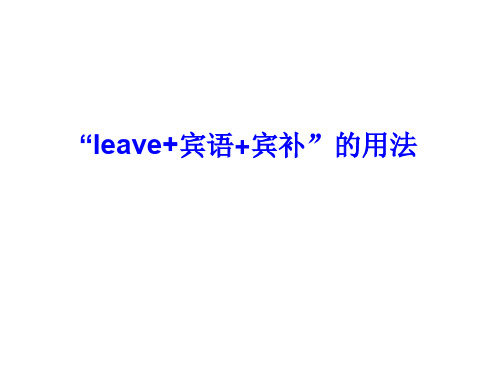
【试题精选】 A good story does not necessarily have to have a happy ending, but the reader must not be left______.(06天津卷) A.unsatisfied B.unsatisfying C.to be unsatisfying D.being unsatisfied 答案:A 2. His remarks left me ______ about his real purpose A.wondered B. wonder C. to wonder D. wondering 3. John rushed out in a hurry, ______ the door _______. A.leaving, unlocked B. leaving, unlocking C. left, unlocked D. to leave, unlocking
“leave+宾语+宾补”的用法
leave + Sb / Sth. + doing / done/ to do / adj / adv /prep
Leave+宾语+宾语补足语, 其中宾语补足这一成分可以由 过去分词、现在分词、形容词、 副词、介词的复合结构等来充当, 分述如下:
1.由过去分词来充当宾语补足语:leave sth/sb done, 常用来表示宾语所处的状态或表示动作已经完成。
3.由形容词来充当宾语补足语: (1)You’d better leave the drawing-room door open. (2)His illness has left him weak.
△可用于被动语态: The window was left open.
leave的四种用法

leave的四种用法一、leave作为动词的基本用法1.1 leave的基本含义Leave作为动词,最基本的含义是“离开”,指某人或物从某个地方或状态中出去或脱离。
例如:- She left the room.(她离开了房间。
)- The train leaves at 10:30.(火车在10:30离开。
)1.2 leave与介词连用的用法Leave还可以与介词连用,构成一些固定短语,表示特定的意义。
常见的有:- leave for:动身去某处- leave behind:留下- leave out:省略- leave off:停止例如:- We are leaving for Beijing tomorrow morning.(我们明天早上出发去北京。
)- He always leaves his homework behind.(他总是把作业落在家里。
)- Don't leave out any details in your report.(你的报告中不要漏掉任何细节。
)- The children left off playing when it started to rain.(下雨开始时孩子们停止玩耍。
)二、leave作为名词的用法2.1 leave作为名词的含义Leave还可以作为名词使用,表示“休假”、“假期”等意义。
例如:- I'm going to take a week's leave next month.(我下个月要请一个星期假。
)- He has been on sick leave for two weeks.(他已经病假两周了。
)2.2 leave作为名词的用法Leave作为名词还可以与其他单词组合成一些固定短语,表示特定的意义。
常见的有:- annual leave:年假- maternity leave:产假- paternity leave:陪产假- sick leave:病假例如:- I have 20 days of annual leave every year.(我每年有20天的年假。
leave+宾语+宾补的用法

Leave+宾语+宾语补足语,其中宾语补足语这一成分可以由过去分词、现在分词、形容词、副词、介词的复合结构等来充当,意思是”使.....处于…..状态;听任;让”现分述如下:1.由过去分词来充当宾语补足语:leave sth/sb done,常用来表示宾语所处的状态或表示动作已经完成。
(宾语和宾补被动关系)(1)He got up slowly, leaving the lunch unfinished.(2)Did you leave the doors and windows firmly fastened(3)I can't leave such an important matter undone/unfinished. 我不能让这样一件重要的事半途而废。
The moving story left him unmoved. 他对这个令人激动的故事竟然无动于衷。
2.由现在分词来充当宾语补足语:leave sb/sth doing,常用来表示使某人或某物一直做某事(宾语和宾补被动关系).(1)Don’t leave her waiting outside in the rain.(2)They went off together and left me sitting there.painting the gate.△可用于被动语态:The papers were left lying around.3.由形容词来充当宾语补足语:(1)You’d better leave the drawing-room door open.(2)His illness has left him weak.△可用于被动语态:The window was left open.4.由副词作宾语补足语(1)What has left him away for so long 什么事使他离开了这么长时间(2)We can’t leave the light on when leaving.5. 由介词的复合结构充当宾语补足语:(1)Leave him in peace!(2)His illness left him with a weak heart.(3)You’ve left her name off the list.(4)This matter left her without a way of hope. 这件事使她没有一丝一毫的希望。
Leave用法透视
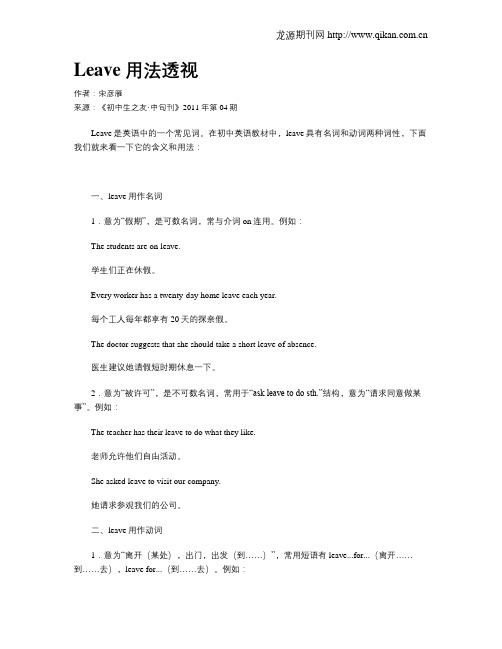
Leave用法透视作者:宋彦雁来源:《初中生之友·中旬刊》2011年第04期Leave是英语中的一个常见词。
在初中英语教材中,leave具有名词和动词两种词性,下面我们就来看一下它的含义和用法:一、leave用作名词1.意为“假期”,是可数名词,常与介词on连用。
例如:The students are on leave.学生们正在休假。
Every worker has a twenty-day home leave each year.每个工人每年都享有20天的探亲假。
The doctor suggests that she should take a short leave of absence.医生建议她请假短时期休息一下。
2.意为“被许可”,是不可数名词,常用于“ask leave to do sth.”结构,意为“请求同意做某事”。
例如:The teacher has their leave to do what they like.老师允许他们自由活动。
She asked leave to visit our company.她请求参观我们的公司。
二、leave用作动词1.意为“离开(某处),出门,出发(到……)”,常用短语有leave...for...(离开……到……去),leave for...(到……去)。
例如:When we reached the station, the train had left.当我们到达火车站时,火车已经开走了。
He is leaving China for Japan tomorrow.他明天将离开中国到日本去。
I’ll be leaving for New York in a day or two.我将在一两天后去纽约。
温馨提示:leave作为短暂性动词,表示“将要离开”时,可用一般现在时表示安排好或计划好的将要发生的动作;用现在进行时表示即将发生的动作。
《leave复合宾语》课件

进行时态
当描述一个正在进行的动作或状 态时,应使用进行时态。例如,
“She is leaving for Beijing tomorrow.”(她明天要去北京
。)
被动语态
当强调动作的承受者时,应使用 被动语态。例如,“The book was left on the train.”(这本
书被落在火车上了。)
《leave复合宾语》ppt课件
contents
目录
• 什么是复合宾语? • leave的用法 • leave复合宾语的构成 • leave复合宾语的分类 • leave复合宾语的例子分析 • leave复合宾语的注意事项
01
什么是复合宾语?
复合宾语的定义
01
复合宾语是指句子中由动词短语 或动词和宾语构成的复杂成分, 通常表示动作或状态的结果或影 响。
leave的特殊用法
01
02
03
04
leave alone:不打扰、 不干预某人或某事。
leave out:排除、不考 虑某人或某事。
leave behind:遗留、 留下某人或某物。
leave to:委托、交给 某人处理。
03
leave复合宾语的构成
宾语+宾补
01
02
03
04
宾语+形容词
I found the book interesting.(我发现这本书
宾语+现在分词
宾语+现在分词作宾补表示动作正在进行
I saw him entering the room.(我看见他正走进房间。)
宾语+现在分词作宾补表示动作的伴随状态
She left her baby sleeping.(她让她的宝宝睡着。)
leave复合结构

目录
小试牛刀
leave + 宾语 + 宾补 宾补:n./adj./ adv./介词短语/小三(done, doing, to do)
意思:“使.....处于…..状态;听任;让”
1. I can't leave such an important matter undone (do). 2. My parents went out to see a film, leaving (leave) me
f
staying (stay) at home.
3. The paper was left lying (lie) on the floor. 4. His illness left him with a weak heart (弱小的心灵). 5. What has left him away (离开) for so long? 6. His illness has left him weak (虚弱的).
leave+宾语+宾补 宾语 + 宾补 宾补:n./adj./ adv./介词短语/小三(done, doing, to do)
意思:“使.....处于…..状态;听任;让”
1. leave sth/sb done,常用来表示宾语所处的状态或表示 动作已经完成。(宾语和宾补被动关系) He got up slowly, leaving the lunch unfinished.(finish) 2. leave sb/sth doing,常用来表示使某人或某物一直做某 事(宾语和宾补主动关系) Don’t leave her waiting (wait) outside in the rain.
C. being run
leave的六种宾补结构

leave的六种宾补结构Leave的六种宾补结构Leave是一个常用的动词,它可以用来表示离开某个地方或情况。
在句子中,leave可以带有宾补结构,用来进一步说明离开的方式、目的或结果。
本文将介绍leave的六种常见宾补结构,分别是leave sb. + adj., leave sb. + n., leave sb. + to do sth., leave sb. + v.-ing, leave sb. + adv. 和 leave sb. + prep. phrase。
一、leave sb. + adj.(使某人处于某种状态)这种结构表示离开后留下某人处于某种状态,常用于描绘情感或心理状态。
例如:1. I was deeply moved by the movie. It left me speechless.(那部电影让我深受感动,让我无言以对。
)2. The news of her promotion left me envious.(她晋升的消息让我羡慕不已。
)二、leave sb. + n.(使某人处于某种状态)这种结构表示离开后留下某人处于某种状态,常用于描述具体的情况或感受。
例如:1. The loud noise left me with a headache.(那嘈杂的声音让我头疼不已。
)2. The unexpected rainstorm left us in a mess.(突如其来的暴雨让我们一片混乱。
)三、leave sb. + to do sth.(让某人去做某事)这种结构表示离开时将某人交给他人或自己去做某事。
例如:1. My boss left me to handle the project on my own.(我的老板让我自己负责处理这个项目。
)2. She left her children to play in the park while she went shopping.(她让孩子们在公园里玩耍,自己去购物。
leave宾语宾补的用法
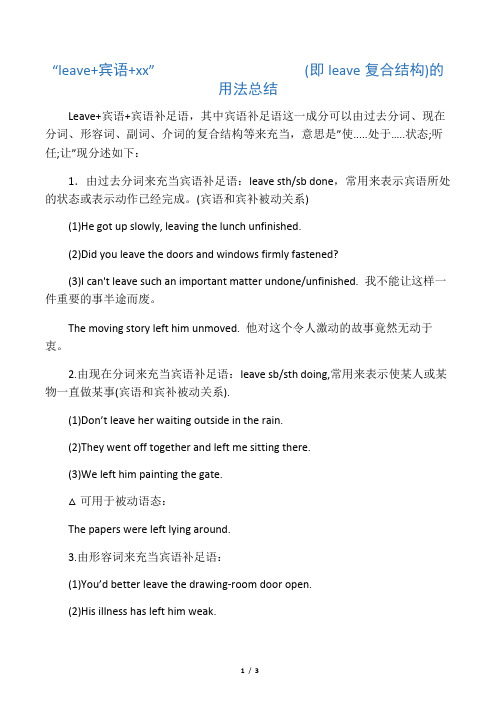
“leave+宾语+xx” (即leave复合结构)的用法总结Leave+宾语+宾语补足语,其中宾语补足语这一成分可以由过去分词、现在分词、形容词、副词、介词的复合结构等来充当,意思是”使.....处于…..状态;听任;让”现分述如下:1.由过去分词来充当宾语补足语:leave sth/sb done,常用来表示宾语所处的状态或表示动作已经完成。
(宾语和宾补被动关系)(1)He got up slowly, leaving the lunch unfinished.(2)Did you leave the doors and windows firmly fastened?(3)I can't leave such an important matter undone/unfinished. 我不能让这样一件重要的事半途而废。
The moving story left him unmoved. 他对这个令人激动的故事竟然无动于衷。
2.由现在分词来充当宾语补足语:leave sb/sth doing,常用来表示使某人或某物一直做某事(宾语和宾补被动关系).(1)Don’t leave her waiting outside in the rain.(2)They went off together and left me sitting there.(3)We left him painting the gate.△可用于被动语态:The papers were left lying around.3.由形容词来充当宾语补足语:(1)You’d better leave the drawing-room door open.(2)His illness has left him weak.△可用于被动语态:The window was left open.4.由副词作宾语补足语(1)What has left him away for so long?什么事使他离开了这么长时间?(2)We can’t leave the light on when leaving.5. 由介词的复合结构充当宾语补足语:(1)Leave him in peace!(2)His illness left him with a weak heart.(3)You’ve left her name off the list.(4)This matter left her without a way of hope. 这件事使她没有一丝一毫的希望。
leave复合结构
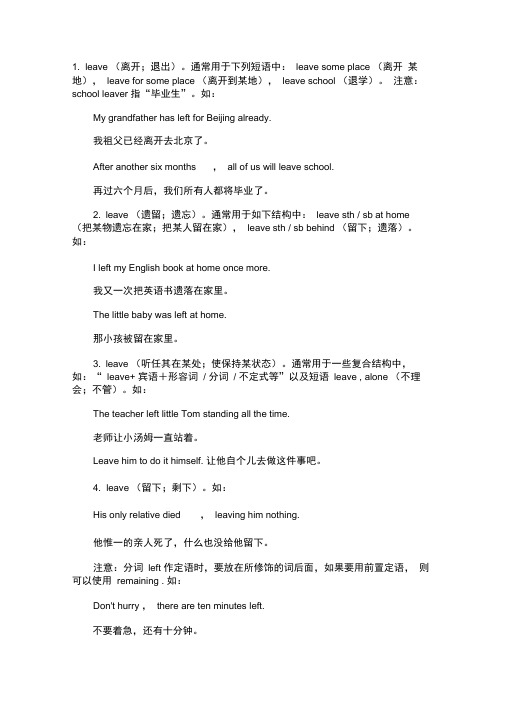
1. leave (离开;退出)。
通常用于下列短语中:leave some place (离开某地),leave for some place (离开到某地),leave school (退学)。
注意:school leaver 指“毕业生”。
如:My grandfather has left for Beijing already.我祖父已经离开去北京了。
After another six months ,all of us will leave school.再过六个月后,我们所有人都将毕业了。
2. leave (遗留;遗忘)。
通常用于如下结构中:leave sth / sb at home (把某物遗忘在家;把某人留在家),leave sth / sb behind (留下;遗落)。
如:I left my English book at home once more.我又一次把英语书遗落在家里。
The little baby was left at home.那小孩被留在家里。
3. leave (听任其在某处;使保持某状态)。
通常用于一些复合结构中,如:“ leave+ 宾语+形容词/ 分词/ 不定式等”以及短语leave , alone (不理会;不管)。
如:The teacher left little Tom standing all the time.老师让小汤姆一直站着。
Leave him to do it himself. 让他自个儿去做这件事吧。
4. leave (留下;剩下)。
如:His only relative died ,leaving him nothing.他惟一的亲人死了,什么也没给他留下。
注意:分词left 作定语时,要放在所修饰的词后面,如果要用前置定语,则可以使用remaining . 如:Don't hurry ,there are ten minutes left.不要着急,还有十分钟。
初中英语使役动词用法总结
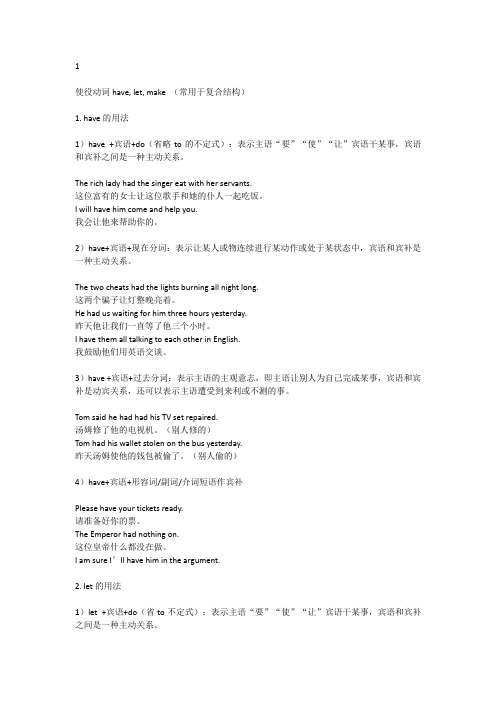
使役动词have, let, make (常用于复合结构)1. have的用法1)have +宾语+do(省略to的不定式):表示主语“要”“使”“让”宾语干某事,宾语和宾补之间是一种主动关系。
The rich lady had the singer eat with her servants.这位富有的女士让这位歌手和她的仆人一起吃饭。
I will have him come and help you.我会让他来帮助你的。
2)have+宾语+现在分词:表示让某人或物连续进行某动作或处于某状态中,宾语和宾补是一种主动关系。
The two cheats had the lights burning all night long.这两个骗子让灯整晚亮着。
He had us waiting for him three hours yesterday.昨天他让我们一直等了他三个小时。
I have them all talking to each other in English.我鼓励他们用英语交谈。
3)have +宾语+过去分词:表示主语的主观意志,即主语让别人为自己完成某事,宾语和宾补是动宾关系,还可以表示主语遭受到来利或不测的事。
Tom said he had had his TV set repaired.汤姆修了他的电视机。
(别人修的)Tom had his wallet stolen on the bus yesterday.昨天汤姆使他的钱包被偷了。
(别人偷的)4)have+宾语+形容词/副词/介词短语作宾补Please have your tickets ready.请准备好你的票。
The Emperor had nothing on.这位皇帝什么都没在做。
I am sure I’ll have him in the argument.2. let的用法1)let +宾语+do(省to不定式):表示主语“要”“使”“让”宾语干某事,宾语和宾补之间是一种主动关系。
关于英语语法中使役动词的用法详细分析

关于英语语法中使役动词的用法详细分析使役意义状态动词get, leave, set, send, keep, drive, etc.常用于复合结构中)1. get:使成为/变得某种状态或结果。
I can’t get the old radio to work.我无法让那旧收音机工作起来。
(接带to不定式作宾补)Can you really get that old car going again?你真能让那旧车运转起来吗?The farmer got his planting done before the rain came.那农民在雨季前完成了种植。
He got his wrist broken.他折断了手腕。
(主语发生了不幸的事)She soon got the children ready for school.她迅速使孩子们做好了上学准备。
2. leave:使保持/处于某种状态Leave your hat and coat in the hall.把帽子和外套放在大厅里。
Did you leave the doors and windows firmly fastened?你把门窗紧紧锁上了吗?Always leave things where you can find them again.总应把东西放在能再次找到的地方。
Who left that window open?谁让窗户开着?Don’t leave him waiting outside in the rain.别让他在外面雨中等待。
Leave somebody / something alone.不要干涉某人或某事。
3. set:使某人或某物处于或达到某种特殊的状态或关系set somebody at his ease 使某人安逸/舒适/心情放松set something in order 使某物井然有序。
- 1、下载文档前请自行甄别文档内容的完整性,平台不提供额外的编辑、内容补充、找答案等附加服务。
- 2、"仅部分预览"的文档,不可在线预览部分如存在完整性等问题,可反馈申请退款(可完整预览的文档不适用该条件!)。
- 3、如文档侵犯您的权益,请联系客服反馈,我们会尽快为您处理(人工客服工作时间:9:00-18:30)。
leave + 宾语 + 宾补 宾补:n./adj./ adv./介词短语/小三(done, doing, to do)
意思:“使.....处于…..状态;听任;让”
6. leave sth/sb 介词短语,让....处于...状态 eg. 让他静静地待着吧。 Leave him in peace. 7. leave sth/sb n.(名词),给....留下... eg.她老公给她留下一大笔钱。 Her husband left her a large amount of money.
目录
小试牛刀
leave + 宾语 + 宾补 宾补:n./adj./ adv./介词短语/小三(done, doing, to do)
意思:“使.....处于…..状态;听任;让”
1. I can't leave such an important matter undone (do). 2. My parents went out to see a film, leaving (leave) me
C. being run
D. to run
THANK YOU
leave + 宾语 + 宾补 宾补:n./adj./ adv./介词短语/小三(done, doing, to do)
意思:“使.....处于…..状态;听任;让”
4. leave sth/sb adj,让....处于...状态 eg. 让窗户开着吧。 The window was left open. 5. leave sth/sb adv,让....处于...状态 eg.我们不能人走灯不灭。 We can’t leave the light on when leaving.
f
staying (stay) at home.
3. The paper was left lying (lie) on the floor. 4. His illness left him with a weak heart (弱小的心灵). 5. What has left him away (离开) for so long? 6. His illness has left him weak (虚弱的).
1. A good story does not necessarily have to have a happy
ending, but the reader must not be left ______.
(06天津卷)
A. unsatisfied
B. unsatisfying
C. to be unsatisfying
leave + 宾语 + 宾补ቤተ መጻሕፍቲ ባይዱ宾补:n./adj./ adv./介词短语/小三(done, doing, to do)
意思:“使.....处于…..状态;听任;让”
3. leave sth/sb to do,常用来表示让...去做某事。(宾补不定式表将来/目的) He left me to do (do) what he told but I refused his order.
leave+宾语+宾补 复合结构
Shining
leave + 宾语 + 宾补 宾补:n./adj./ adv./介词短语/小三(done, doing, to do)
意思:“使.....处于…..状态;听任;让”
1. leave sth/sb done,常用来表示宾语所处的状态或表示 动作已经完成。(宾语和宾补被动关系) He got up slowly, leaving the lunch unfinished.(finish) 2. leave sb/sth doing,常用来表示使某人或某物一直做某 事(宾语和宾补主动关系) Don’t leave her waiting (wait) outside in the rain.
D. being unsatisfied
2. His remarks left me ______ about his real purpose. A. wondered B. wonder C. to wonder D. wondering
3. John rushed out in a hurry, ______ the door _______.
A. leaving, unlocked
B. leaving, unlocking
C. left, unlocked
D. to leave, unlocking
4. Don’t leave the water ______ while you brush your teeth.
A. running
B. run
